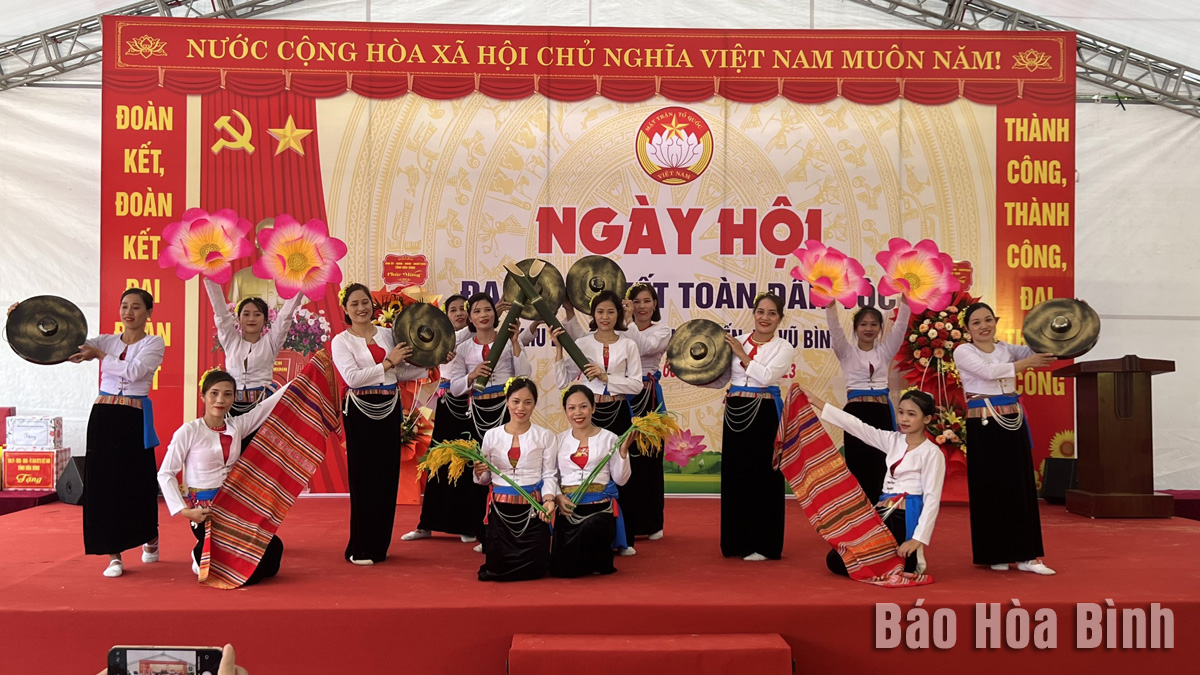
Located about 9km from the centre of Lac Son district, Vu Binh commune is home to 20 hamlets with 2,581 households and 11,925 people, more than 90% of whom are Muong ethnic people. Implementing the movement of "All people stay united to build a civilised lifestyle”, it has obtained many encouraging results, thus contributing to local socio-economic development.
Residents in Quyet Tien hamlet of Vu Binh commune (Lac
Son district) join in a singing and dancing performance at the Great National
Solidarity Festival.
Chairman of the communal People’s Committee Bui
Van Dan said that over the recent past, Vu Binh has encouraged locals to
strongly take part in emulation movements, comply with the Party and State’s
guidelines, policies and laws, develop livelihoods, and preserve traditional
culture.
In 2023, all the 20 hamlets were recognised as
"residential zones of culture” and 2,267 of the 2,581 households as "households
of culture”, equivalent to 87.8%. Among them, 716 households, or over 27.7%,
obtained the title for three consecutive years.
Movements and campaigns have been carried out
with diverse contents and in various forms, helping promote the strength of the
great national solidarity, give a facelift to rural areas, and improve people’s
life quality. Outstanding movements and campaigns include those calling for
solidarity in building new-style countryside and civilised urban areas,
encouraging farmers to boost agricultural production and trade, assisting the
youth to start careers, and engaging war veterans in the building of new-style
rural areas. As a result, many effective crop cultivation, animal farming, and
handicraft production models have taken shape, generating good profit and
income for people, Dan noted.
In addition, the commune has paid attention to
repairing and upgrading roads and mobilising local residents’ participation in
cleaning roads and dredging gutters. Partly supported with resources from the
public, it has completed concreting the roads within and linking many hamlets.
People’s consensus and all-level authorities’ attention have helped Vu Binh
make considerable improvement and better people’s life quality.
So far, the rate of concreted roads across
hamlets has reached 80.5% while concreted and paved canals and ditches now
account for 67.08%. There are no longer makeshift houses in the commune. Per
capita average income this year is estimated at 48 million VND (nearly 2,000
USD) while the multidimensional household poverty rate has been brought down to
12.8%. All local households have also gained access to hygienic water and the
national power grid.
Besides, cultural and social aspects have
recorded improvement, the political system been ensured, and security and
social order firmly maintained. Cultural, musical, and sport activities have
also been held frequently, helping better people’s spiritual life, according to
the official.
Gongs hold a special place in the cultural and spiritual life of the Muong ethnic people in Hoa Binh province. More than musical instruments, they are an indispensable part of community rituals and collective memory, echoing through generations as a spiritual thread linking the past, present, and future.
Preserving and promoting the cultural values of the Muong ethnic group has become an urgent task in the current context, as many traditional values face the risk of fading away. This effort requires not only protecting the cultural identity but also eliminating outdated customs and developing a modern cultural lifestyle, contributing to sustainable values for the Muong community in Hoa Binh province.
The Muong ethnic culture, deeply rooted in Vietnam’s mountainous north, continues to be preserved and revitalised by dedicated individuals and communities determined to safeguard their ancestral identity.
The Muong group is one of the largest ethnic minorities in Vietnam, primarily found in Hoa Binh province. The Muong people in Hoa Binh boast a rich and diverse cultural treasure that reflects the unique identity of this ethnic group. Accounting for over 63% of the province's population, they have created and preserved numerous distinctive cultural values, contributing to their unique identity. Their cultural heritage is an invaluable asset, at the heart of their national identity, and represents a vibrant spiritual life that must be preserved and promoted in today’s modern world.
For generations, the ethnic communities of Hoa Binh province, particularly the Muong people, have preserved vibrant festivals deeply intertwined with the region’s geography, nature, and social traditions. These celebrations enrich Hoa Binh’s spiritual life and cultural identity, reflecting both folk beliefs and the intermingling of ethnic customs. Many of these festivals have endured the test of time, passed down through generations and continuing to thrive today. Among them, the Khai Ha (Going Down to the Field) festival stands out as one of the most significant events of the Muong ethnic group.
Muong calendar, known as sach doi, is an ancient folk knowledge system developed through observations of the movement of the pleiades star. This unique calendar consists of 12 bamboo sticks, each representing a lunar month. Specific days within each month are marked with distinct symbols, guiding locals in determining auspicious and inauspicious days for important activities.



